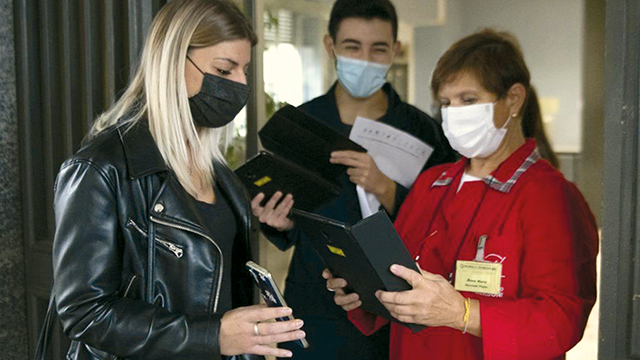Following the recent decrease in newly detected coronavirus cases and fatalities, the vaccination rate has significantly dropped in Georgia.
Health officials are alarmed, and are calling on the population to get vaccinated.
“There is a serious need to stimulate the vaccination program,” said Tamar Gabunia, Georgia’s deputy health minister.
However, contrary to their calls, last week, billboards promoting the vaccination process in Georgia were replaced by political images aimed against the opposition United National Movement party. The NCDC called for the immediate restoration of the vaccine-supporting posters.
Meanwhile, various organizations are trying to improve the situation and fight the population’s distrust towards vaccines and vaccination. One example can be found in UNICEF, whose representatives recently visited the Guria region within the teachers’ vaccination campaign aimed at safe school reopening.
“As frontline workers, it is important that teachers have access to vaccinations for safe school reopening. Teachers from Ozurgeti, Lanchkhuti and Chokhatauri municipalities attended the info sessions and received answers from prominent doctors,” UNICEF announced.
After the meeting, many teachers got vaccinated against Covid-19. The meeting was organized by UNICEF in partnership with the Ministry of Education and Science, and the NCDC.
Earlier this month, UNICEF also visited the Kakheti region to promote the vaccination process among local teachers. The campaign is expected to continue across the country.
Moreover, to help Georgia fight the pandemic, the EU, four UN organizations (WHO, UNFPA, UNICEF, UNOPS) and the Ministry of IDPs from the Occupied Territories, Labor, Health and Social Affairs of Georgia launched a new initiative, “Minimizing the impact of the Covid-19 outbreak in Georgia through telemedicine and digital health solutions”.
Under this new EU-UN action, 200 rural facilities will receive basic equipment, and another 50 will receive telemedicine equipment to support the safe management of Covid-19, while also ensuring uninterrupted and expanded access to care for persons with chronic conditions, and provision of routine health services for children.
Regarding fatalities caused by the disease, unfortunately, the number of young people, and even children becoming victims is increasing in the country. This is obviously related to the spread of the more aggressive Delta variant and other new strains.
On September 20, infant twins infected with coronavirus, who were being treated in the intensive care unit of the Beaumonde Clinic in Kutaisi, died. The twins had been at the medical facility for more than a month. Both of them were infected with coronavirus at birth and developed Covid pneumonia.
A 33-year old woman died this week due to a blood clot which developed after her being infected with and then recovering from coronavirus.
The Statistics
Georgia reported 2470 coronavirus cases, 2243 recoveries, and 46 deaths on Tuesday. Tbilisi recorded the highest number of 705 Covid-19 cases, followed by the Imereti region with 492 cases, and the Kakheti region with 319 cases.
The country reported 2016 coronavirus cases, 2024 recoveries, and 43 deaths on Wednesday. Tbilisi recorded 708 cases, Imereti 289 cases and Kakheti 301 cases.
There were 1653 new cases, 2646 recoveries and 47 deaths on Thursday, with 28,553 tests having been conducted.
Coronavirus detection rates in the country are: 6.85% in the last 14 days, 6.44% in the last seven days.
A total of 602,065 cases of coronavirus infection have been identified in Georgia since February 2020, of which 570,443 people have recovered and 8711 have died.
The Global Situation
There has been important international news this week, regarding both Covid-19 and the vaccination process.
The US
The US is easing its coronavirus travel restrictions, reopening to passengers from the UK, EU and other nations. The move answers a major demand from its European allies.
From November, foreign travelers will be allowed to fly into the US if they are fully vaccinated, and will have to undergo testing and contact tracing, the BBC reported.
The US has had tough restrictions on travel in place since early last year.
“The current rules bar entry to most non-US citizens who have been in the UK and a number of other European countries, China, India, South Africa, Iran and Brazil within the last 14 days.
“Under the new rules, foreign travelers will need to demonstrate proof of vaccination before flying, obtain a negative Covid-19 test result within three days of traveling, and provide their contact information. They will not be required to quarantine,” reports the BBC.
Italy
Based on the same source, Italy is to make it compulsory for all workers to have a Covid “green pass” – proof of vaccination, a negative test, or recovery from the virus. Anyone without a pass will reportedly face suspension from work and may have their pay stopped after five days.
The measures are a first for Europe, and are some of the strictest in the world.
They are due to come into force on October 15, and aim to boost vaccinations in a country that has been badly hit by the virus.
School staff are also required to show a pass, and some teachers have reportedly been turned away from work.
Armenia
“In Armenia, a new bill presented to the Armenian parliament would mandate all state employees to either be vaccinated or submit bi-weekly PCR tests. Some have raised complaints that high-ranking officials, including ministers, MPs, and judges, would be exempted,” OC Media reported this week.
If the bill passes, it would come into force on October 1 and would apply to all individuals working for the government, including municipal employees, as well as privately employed individuals in several sectors, among them industrial production, construction, transport, retail, and education.
Reportedly, pregnant women and those who have permission to forgo the vaccine for health reasons would also be exempted.
By Ana Dumbadze














